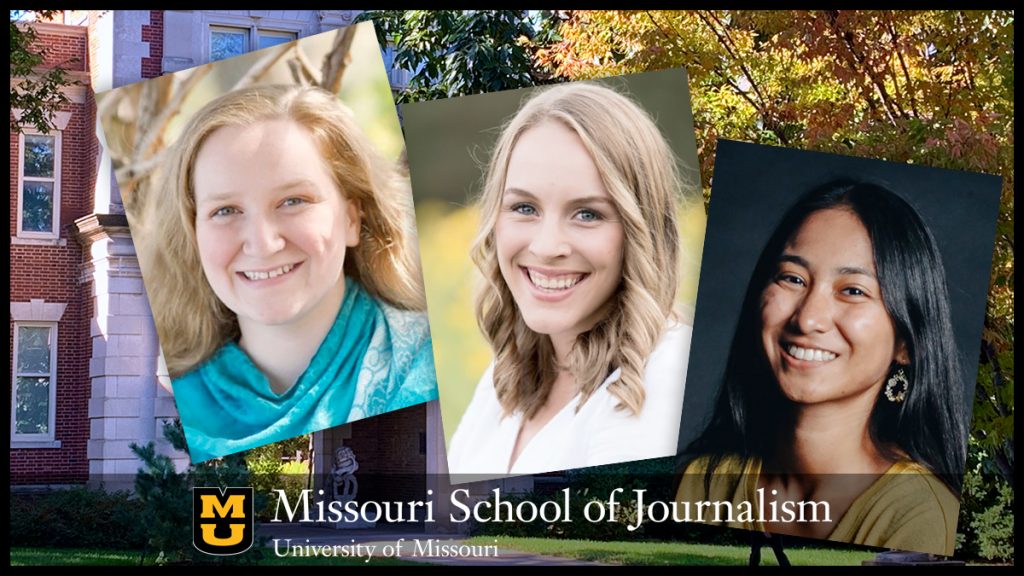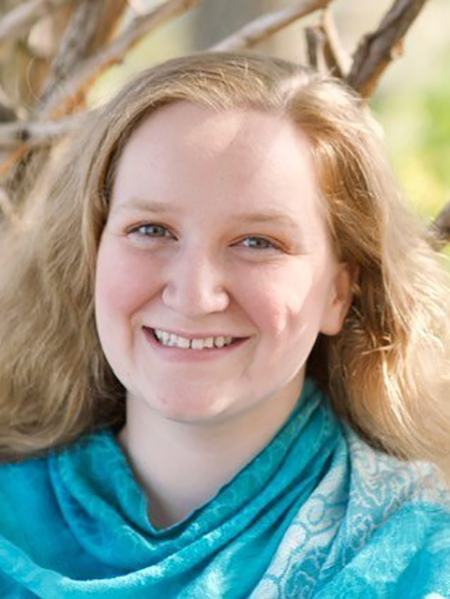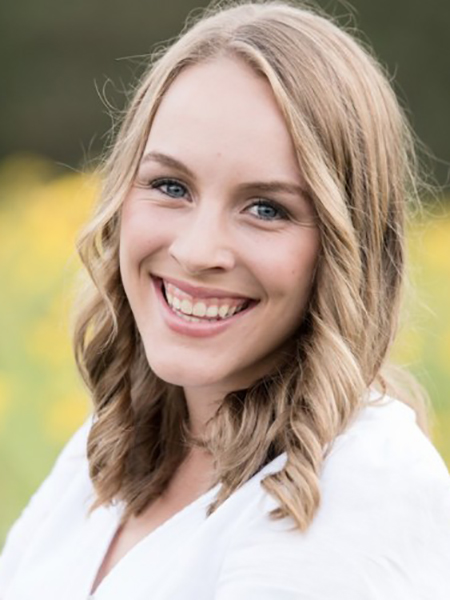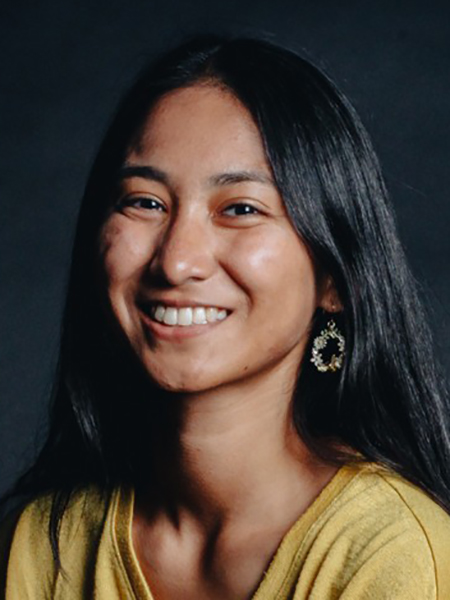Journalism students encouraged to conduct undergraduate research, explore new opportunities

Columbia, Mo. (Oct. 25, 2021) — To some, the word “research” might conjure up images of people in white lab coats wielding syringes and studying bacteria, but each year, students at the Missouri School of Journalism take part in undergraduate research that breaks the mold.
Through a variety of scholarly programs that pair students with a faculty advisor from the start of their college careers — in addition to offering scholarships and stipends — students can conduct undergraduate research related to the field of journalism, an opportunity they often describe as “eye-opening” and one that encourages them to experiment outside their comfort zones.

“I had always thought of research as part of the hard sciences, like chemistry, so I didn’t actually realize journalistic research existed,” said sophomore Bailey Stover. “But when I came to Mizzou, I was asked if I wanted to work more on the hands-on newspaper side or on the journalistic research side, so I took the opportunity to do something that was new for me.”
As a Discovery Fellow, Stover is working under advisor and associate professor Amanda Hinnant to survey critical opinions about what makes online news comment sections over the history of their existence. The democratic promise of public participation, the misinformation crisis, and how journalists tried to make vitriolic spaces more constructive are all part of the 20-year analysis.
By carefully cataloguing and analyzing expert opinions on the subject, Stover is contributing to research into how to understand the perceived benefits and potential harm of user comments on journalism. survey critical opinions about what makes internet comment sections positive or negative and how to make vitriolic spaces more constructive.
“The articles I’m reviewing are answering questions like, should comment sections be regulated?” Stover said. “Should they be open on some stories and not others? Maybe they should just be open for one day after a story is posted? Cataloguing these opinions will build a solid foundation from which to attack the problem.”
Stover, who is also a Walter Williams Scholar, has not decided what the future holds for her just yet, but she is making the most of her opportunities at Mizzou; she’s working as a student employee doing science communication work across the campus in the College of Agriculture, Food and Natural Resources, double majoring in journalism and Spanish, and participating in the MU Language Partner program, which pairs English native speakers with non-native speakers to practice language skills. She is considering making the most of both degrees with a stint in the Peace Corps after graduation, perhaps as an English teacher in South America.

But Stover isn’t the only journalism student using the support of a scholarly program to explore a diverse array of opportunities. Senior Jessica Blake is a Stamps Scholar, part of a national program that pays full tuition for four years and a $16,000 stipend. She has participated in undergraduate research throughout her time at Mizzou, with topics ranging from analyzing trends in state legislation to comparing how media laws differ from country to country. She is still hard at work on the latter project, with associate professor Brett Johnson as her advisor.
And that’s not all — Blake is currently co-president of Mizzou Women in Media, a student organization devoted to promoting women in the media industry. She also covers education as a reporter at the Columbia Missourian and is a Walter Williams Scholar mentored by none other than the School of Journalism’s dean, David Kurpius. She credits this broad range of experiences as a student with opening her up to possibilities she never knew existed.
“Law was always in the back of my mind, but I never envisioned myself in a particular place in the industry,” she said. “At the same time, I’ve always loved the idea of using writing to give voices a platform. When I took a communications law course taught by Brett Johnson, it was such an eye-opening experience to an area of law that combines both of those interests.”
That experience, along with financial support and connections made through the Stamps program, led to an internship in Washington, D.C. last spring with the Reporters Committee for Freedom of the Press. The nonprofit organization provides pro bono legal services to journalists in need, such as those arrested while covering the Black Lives Matter protests.

Blake’s willingness to explore different paths echoes Stover’s openness; indeed, exploration is a common theme for journalism students. Freshman Yasmeen Saadi, another Stamps Scholar and Walter Williams Scholar, is working on research under professor Mark Horvit to collect and analyze data and records on police misconduct reports. She volunteered last year as a feature writer for the American Red Cross, writes for campus newspaper The Maneater, is an active member of the Mizzou Asian American Association, and earlier this month she had dinner with MU Chancellor Mun Choi along with other Stamps Scholars.
Saadi’s research concerning police misconduct has fed an interest in criminal justice reporting, but she also ran a club in high school that helped tutor inner city elementary school students and would like to get involved in education reporting. The story is the same for so many journalism students, whether they are involved in a scholarly program or are otherwise looking to expand their horizons. The common thread is a desire to learn by doing, both in the newsroom and through research. It’s a philosophy Blake ascribes to the support students receive from faculty advisors, mentors, and leaders.
“It’s been huge in my development as a student to have people who believe in me,” Blake said. “Coming out of high school, I saw myself as just an average student. I had never seen myself as someone who could be a Stamps Scholar. But there were people who saw that in me, even when I didn’t see it in myself.”
Updated: October 27, 2021
Related Stories
Expand All Collapse All- 2023
- 2022
-
2021
- Oct 25, 2021 Journalism students encouraged to conduct undergraduate research, explore new opportunities
- Sep 28, 2021 Missourian wins 51 Missouri Press Association awards
- Sep 07, 2021 Missouri School of Journalism welcomes 80 high-achieving Walter Williams Scholars to campus
- Jun 30, 2021 Missouri School of Journalism Professor Amy Simons wins first place in national teaching competition
- Apr 27, 2021 Journalism students awarded three of four 2021 Hesburgh Scholarships
-
2020
- Aug 28, 2020 Missouri School of Journalism welcomes 85 high-achieving Walter Williams Scholars to campus
- May 08, 2020 Missouri School of Journalism student receives Outstanding Discovery Fellows award for undergraduate research
- Apr 15, 2020 Katelynn McIlwain and Titus Wu receive MU Award for Academic Distinction
- Feb 27, 2020 Missouri School of Journalism Associate Professor Amy Simons wins national Excellence in Teaching award
-
2019
- Aug 22, 2019 School welcomes 88 high-achieving Walter Williams Scholars to campus
- May 08, 2019 13 Students Inducted Into Alpha Delta Sigma
- May 07, 2019 Associate Professor Amy Simons Awarded 2019 Excellence in Online Class Facilitation Award
- Feb 27, 2019 12 Journalism Students Selected for Mizzou '39 Honors
-
2018
- Dec 12, 2018 Senior Makayla Looney Awarded Inaugural KMBC Larry Moore Journalism Scholarship
- Sep 06, 2018 Journalism undergrad co-publishes research in academic journal
- Aug 31, 2018 School Welcomes 50 High-Achieving Walter Williams Scholars to Campus
- May 17, 2018 Journalism Student Takes Deep Dive into Research, Learns Time Management Skills as Discovery Fellow
-
2017
- Oct 24, 2017 Missouri School of Journalism Honors 50 Freshmen as 2017 Walter Williams Scholars
- Jul 31, 2017 2016-17 Awards, Honors and Recognitions
- May 23, 2017 Freshman Caroline Dade Named Outstanding First-Year Discovery Fellow
- May 05, 2017 Convergence Journalism Professor Wins Excellence in Education Award
-
2016
- Nov 30, 2016 5th Annual Unity Conference Empowers Millennials in Media Industry
- Nov 28, 2016 University of Missouri Selected to Offer Prestigious Stamps Scholars Program
- Sep 09, 2016 Over 500 Students Learn About 35 Journalism-Related Student Organizations
- Jul 12, 2016 Again: Missouri Students, Faculty, Staff Celebrate 560-Plus Annual Awards and Honors
- Apr 18, 2016 Mizzou Women in Media Wins Excellence Award
- Apr 15, 2016 Humans of Strat Comm: Alise Murawski
- Mar 21, 2016 Convergence Journalism Professor Honored for Promoting Equality
- 2015
- 2014
- 2013
- 2012
- 2011
- 2010
- 2009
- 2007
- 2006
- 2005